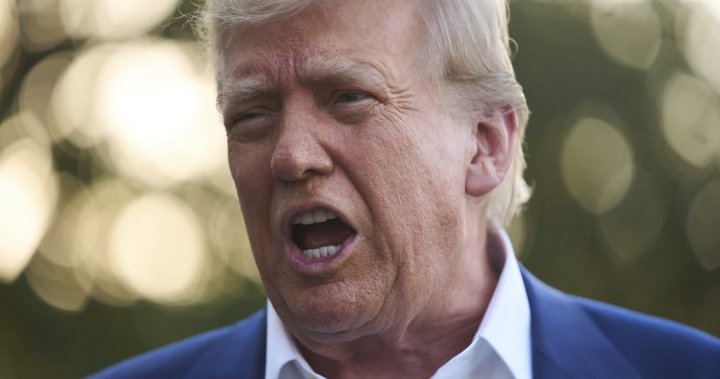U.S. President Donald Trump says his administration is terminating trade talks with Canada, “effective immediately.”
Trump said on Truth Social the decision was due to Canada, which he called “a very difficult country to trade with,” moving ahead with a digital services tax on American technology firms that operate in Canada.
“Based on this egregious Tax, we are hereby terminating All discussions on Trade with Canada, effective immediately,” he wrote. “We will let Canada know the Tariff that they will be paying to do business with the United States of America within the next seven day period.”
The statement comes after Trump and Prime Minister Mark Carney had agreed at last week’s G7 leaders’ summit in Alberta to pursue negotiations on a new trade and security deal within 30 days.
Pressure had been mounting on Ottawa from Canadian and U.S. business groups to pause the planned digital tax before it’s set to kick in on June 30 to allow space for those negotiations.
But Finance Minister François-Philippe Champagne said last week the legislation was passed by Parliament and Canada is “going ahead” with the tax.
“The (digital services tax) is in force and it’s going to be applied,” he told reporters before a cabinet meeting on Parliament Hill.
Global News has reached out to Champagne’s office and the Prime Minister’s Office for comment on Trump’s statement.
The digital services tax will hit companies like Amazon, Google, Meta, Uber and Airbnb with a three per cent levy on revenue from Canadian users.
It will apply retroactively, leaving U.S. companies with a US$2 billion bill due at the end of the month. A June 11 letter signed by 21 members of Congress said U.S. companies will pay 90 per cent of the revenue Canada will collect from the tax.
The Trump administration has been seeking to eliminate other countries’ digital sales taxes, particularly in Europe, that the U.S. argues would be unfairly harmful to American firms.

Get daily National news
Get the day’s top news, political, economic, and current affairs headlines, delivered to your inbox once a day.
Those countries, as well as Canada, have argued such taxes are necessary to ensure fairness between countries that rely on services that don’t pay corporate taxes
Canadian and U.S. business groups, organizations representing U.S. tech giants and American members of Congress have all signed letters in recent weeks calling for the tax to be eliminated or paused.
“For many years, the Business Council of Canada has warned that the implementation of a unilateral digital services tax could risk undermining Canada’s economic relationship with its most important trading partner, the United States. That unfortunate development has now come to pass,” Goldy Hyder, president and CEO of the Business Council of Canada, said in a statement to Global News on Friday.
“In an effort to get trade negotiations back on track, Canada should put forward an immediate proposal to eliminate the DST in exchange for an elimination of tariffs from the United States.”
Rick Tachuk, president of the American Chamber of Commerce in Canada, criticized Champagne’s refusal to consider pausing the tax in an opinion article published in the Financial Post on Wednesday.
“It’s hard to understand why Ottawa would forgo flexibility at such a sensitive moment,” he wrote, arguing moving ahead “risks worsening an already fragile Canada-U.S. relationship.”
Carney said last Thursday that Canada will “adjust” its counter-tariffs on U.S. steel and aluminum depending on the outcome of trade and security negotiations.
U.S.-Canada Trade Minister Dominic LeBlanc, who had been leading the talks until recently, told Global News ahead of the G7 that Canada could raise other counter-tariffs if a deal is not made soon.
The Prime Minister’s Office had announced on Monday that Kirsten Hillman, Canada’s ambassador to the U.S., would take on the role as Canada’s top negotiator.
Hillman, LeBlanc and other Canadian officials have been meeting with the Trump administration for several weeks to discuss reducing or eliminating U.S. tariffs on Canada.
Those tariffs have been steadily building and include not just sector-specific duties like steel, aluminum and autos, but also broad tariffs related to fentanyl and border security.
The White House has previously said Canada would pay a blanket 12 per cent tariff on exports to the U.S. if those fentanyl-related tariffs were to be removed, under the Trump administration’s so-called “reciprocal tariff” policy.
That policy seeks to match U.S. tariffs to those imposed by other countries as well as account for “foreign trade barriers.” In a March report, U.S. Trade Representative Jamieson Greer listed Canada’s digital services tax as an example of such barriers.
Trump repeatedly terminated trade talks with Canada or threatened to do so during the difficult negotiations in his first term on updating the North American Free Trade Agreement.
In those cases, as he did Friday, Trump would bring up the steep tariff rate quotas for foreign dairy products under Canada’s supply management system, which has long been fought by U.S. governments and industry.
Those suspensions were typically short-lived, however, and both countries and Mexico ultimately managed to secure the Canada-United States-Mexico Agreement (CUSMA). The updated free trade pact is due for review next year, but Trump has upended much of it with his aggressive tariff policy.
The Trump administration has said goods traded under existing CUSMA rules aren’t subject to the new tariffs after Trump ordered several carve-outs under the pact.
—With files from the Canadian Press
Read the full article here


